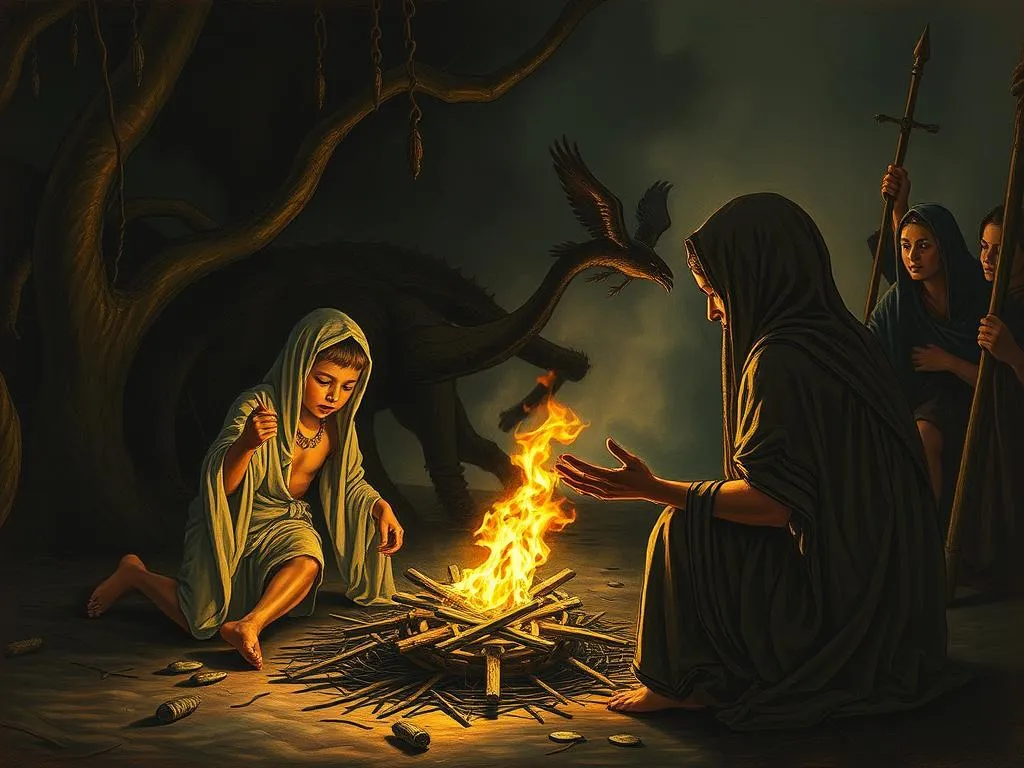Introduction
The concept of ‘child sacrifice’ is often shrouded in mystery and controversy, evoking strong emotions and complex spiritual undertones. However, when we delve deeper into the spiritual realm, we uncover a profound and transformative understanding of this ancient practice. In this article, we’ll explore the child sacrifice spiritual meaning and how it can shed light on our own personal and collective spiritual journeys.
From the outset, it’s important to acknowledge that the child sacrifice spiritual meaning is a sensitive and nuanced topic. It’s not our intention to glorify or condone any practices that cause harm to children. Rather, our aim is to approach this subject with empathy, wisdom, and a deep respect for the sacred nature of life.
Key Takeaways
- The Symbolic Significance of ‘Child Sacrifice’: The child sacrifice spiritual meaning is often rooted in the idea of letting go of the ego, embracing vulnerability, and surrendering to a higher purpose.
- The Cycle of Rebirth and Transformation: ‘Child sacrifice’ can be seen as a metaphor for the process of shedding old patterns, beliefs, and identities to make way for personal growth and spiritual evolution.
- The Importance of Innocence and Purity: The child sacrifice spiritual meaning can also be interpreted as honoring the inherent wisdom and clarity that children embody, and using that as a guidepost for our own spiritual development.
- The Paradox of Sacrifice and Offering: In some spiritual traditions, ‘child sacrifice’ is viewed as a selfless act of devotion, where the individual sacrifices their own desires for the greater good of the community or the divine.
Unpacking the Symbolic Significance of ‘Child Sacrifice’
At the heart of the child sacrifice spiritual meaning lies the idea of letting go of the ego and embracing a deeper, more authentic version of ourselves. Children are often seen as embodiments of innocence, vulnerability, and pure, unconditioned consciousness. When we engage with the concept of ‘child sacrifice,’ we are invited to reflect on our own attachments, fears, and the ways in which we cling to our limited sense of self.
In many spiritual traditions, the act of ‘child sacrifice’ is not about the literal killing of a child, but rather a metaphorical surrender of our own egoic desires, beliefs, and patterns. It’s a symbolic gesture of letting go, of allowing ourselves to be stripped down to our core essence, and of opening ourselves up to the transformative power of the divine.
This process of surrender and rebirth is often mirrored in the cycles of nature, where death and decay give way to new life and growth. Just as a seed must die in order to sprout and blossom, the child sacrifice spiritual meaning suggests that we too must be willing to let go of the old in order to embrace the new.
The Cycle of Rebirth and Transformation
One of the profound insights offered by the child sacrifice spiritual meaning is the understanding that growth and transformation often require a willingness to let go of the familiar and the comfortable. Just as a child must eventually outgrow their childhood in order to become an adult, we too must be willing to let go of our own limiting beliefs, patterns, and identities in order to evolve and expand our consciousness.
This process of shedding the old and embracing the new can be both exhilarating and deeply challenging. It requires a level of courage, vulnerability, and trust in the unknown that can be profoundly transformative. When we engage with the child sacrifice spiritual meaning, we are invited to confront our own fears, attachments, and resistance to change, and to ultimately surrender to the cycles of life that call us to grow and evolve.
Honoring Innocence and Purity
Another key aspect of the child sacrifice spiritual meaning is the deep reverence and respect for the inherent wisdom and clarity that children embody. Children are often seen as living embodiments of innocence, curiosity, and a direct connection to the divine. In many spiritual traditions, children are viewed as teachers, reminding us of the importance of presence, wonder, and a beginner’s mind.
When we engage with the child sacrifice spiritual meaning, we are called to honor and cultivate these qualities within ourselves. We are invited to let go of our own preconceptions, biases, and the layers of conditioning that can obscure our innate wisdom and clarity. By embracing the child-like qualities of openness, curiosity, and a willingness to learn, we can tap into a deeper well of spiritual understanding and growth.
The Paradox of Sacrifice and Offering
In some spiritual traditions, the child sacrifice spiritual meaning is not seen as an act of violence or destruction, but rather as a selfless offering to the divine. This perspective views the ‘sacrifice’ as a profound act of devotion, where the individual willingly surrenders their own desires, attachments, and sense of self for the greater good of the community or the sacred.
This paradox of sacrifice and offering is a powerful reminder that true spiritual growth often requires a willingness to let go of our own ego-driven agendas and to align ourselves with a higher purpose. When we are able to transcend our own limited perspectives and connect with a deeper sense of meaning and purpose, we can tap into a wellspring of spiritual power and transformation.
Conclusion
As we’ve explored, the child sacrifice spiritual meaning is a complex and multifaceted concept that invites us to consider the deeper layers of our own spiritual journey. Whether it’s the symbolic letting go of the ego, the cycles of rebirth and transformation, the reverence for innocence and purity, or the paradox of sacrifice and offering, this ancient practice can serve as a powerful catalyst for personal and collective growth.
By engaging with the child sacrifice spiritual meaning with an open heart and a willingness to explore the unknown, we can unlock new depths of understanding, compassion, and connection to the divine. So, let us embrace the wisdom and insights that this profound concept has to offer, and use them to continue our own spiritual evolution and the evolution of our shared human experience.








